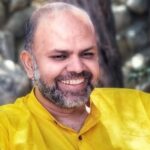Our identities are created through an engagement with our world. They are not rigid and hard entities. The mahabhArata is a tale of destruction that ensues when people in power rigidify their identity. One can only feel threatened by reality as it emerges since the ever changing world will only sometimes conform to our needs and expectations of it! One must then defend one’s identity with violence and seek to dominate the world and make it conform to our formulation.
One of the explorations that the Immersion offered was the process by which we form our inner selves. We can engage with the world from a fullness within, and when the world welcomes this expression there is an unfolding and love. It can choose to negate the offering and one feels hurt and challenged. Coversely, one can withdraw from all engagement and feel depleted within. The world in its turn could choose to ignore us, and leave us to our own devices in our lonely world. The world can choose to accept our depleted state and offer help. These experiences keep changing but we tend to hold on to one or the other of these experiences as a defining state and build our identities around this assumption.
The idea behind asking groups to choose a character they wish to explore and making them explore the whole context that is created equally by the various protagonists is based on this understanding of how one creates dukha by getting entrenched in a few possible ways of being, and by holding the others in fear.
Shakuni is universally considered to be a villain. The group that chose to explore shakuni ‘inside out’ took a difficult path. It came as no surprise when the group decided to have two people playing each of the three roles namely, shakuni, yudhishtra and duryOdhana! The idea of exploring villainy is daunting. The scene they explored was the one where yudhishtra is enticed to gamble.
Yudhishtra struggles with his shadow self. The presentation of always being righteous and playing by the book, achieved by repressing a part of the self that would like to throw caution to the winds, is challenged. yudhishtra has the freedom to say no, but his compulsion gets the better of him. shakuni is an honest broker, he is here to ensure that his sister and her family are not cheated by the scheming kuru clan. When the standard of honour and integrity expected of a great Kingdom is not lived up to, one has to fall back on one’s ingenuity. The enactment centered around the encounter between a shakuni, employing his wits to survive and prosper in a space where there is no real respect for the law, and the law abiding yudhistra, battling his own inner demons.
The new perspective that was presented gripped the group: shakuni was doing what any one who has seen his sister being illtreated by the in-laws would do! If we remove the idealized picture of world, we see its underbelly, a chaotic place where each one is trying to defend themselves, to survive, and hopefully come out on top! In such a world, the trickster’s wits are essential. In all ancient mythologies, it is the trickster hero who gets the fire from the gods, and who helps the tribe grow without paying a heavy price. Seen this way, krishNa is a trickster too! The heavy price paid by a socialized mind also became evident. yudhishtra is the arch symbol of the “good son/ good citizen” the price of being called good, of having to control one’s impulses and postpone its fulfillment is hidden craving for the forbidden. Also, the group got in touch with the helplessness that assails us when the world around us is not law abiding, and we value honesty. Along with the control we exercise over our impulses, we give up our intuition and animal sensing of danger and of the other person’s motives.
What happens to us, as a nation, when the context becomes unpredictable, and the rule of law does not operate? We tend to get paralyzed, or we fall back on our own resources of power and cunning. The chaos that ensues also releases some of our constraints and our shadow sides play up. A negative spiral starts ending up with a raw use of power, there is fighting and war! We see this in families too.

 Anoop is a student of Yoga, an entrepreneur, a coach and a father of two young boys. He has led successful leadership stints in both the corporate and non-for-profit sectors. On encountering the country’s water/farmer crises at close quarters, he decided to pause and examine the impact various ‘isms’ – capitalism, colonialism, etc., were having on us as individuals, families, the society and the environment at large. This quest led him to formally engage with traditional Indic knowledge systems while also learning from the latest advances in science – about our physical and mental wellbeing, importance of body and mind work in healing trauma and the urgent need for a conscious rebuilding of family / work / social structures if we have to thrive individually and collectively. Insights, frameworks and processes gleaned from these on-going studies, an anchorage in his own personal practice and his wide-ranging experiences is what Anoop brings to facilitation/coaching spaces in Ritambhara and his various professional engagements.
Anoop is a student of Yoga, an entrepreneur, a coach and a father of two young boys. He has led successful leadership stints in both the corporate and non-for-profit sectors. On encountering the country’s water/farmer crises at close quarters, he decided to pause and examine the impact various ‘isms’ – capitalism, colonialism, etc., were having on us as individuals, families, the society and the environment at large. This quest led him to formally engage with traditional Indic knowledge systems while also learning from the latest advances in science – about our physical and mental wellbeing, importance of body and mind work in healing trauma and the urgent need for a conscious rebuilding of family / work / social structures if we have to thrive individually and collectively. Insights, frameworks and processes gleaned from these on-going studies, an anchorage in his own personal practice and his wide-ranging experiences is what Anoop brings to facilitation/coaching spaces in Ritambhara and his various professional engagements.
 Priya is a Yoga therapist in the Krishnamacharya tradition. She adapts Reiki & energy work, Vedic chanting, life coaching & Ayurvedic practices in her healing spaces. She is committed to nurturing collectives that have the praxis of Yoga at their heart.
Priya is a Yoga therapist in the Krishnamacharya tradition. She adapts Reiki & energy work, Vedic chanting, life coaching & Ayurvedic practices in her healing spaces. She is committed to nurturing collectives that have the praxis of Yoga at their heart. Anisha has been on an exploration to understand herself through yoga for the last 15years which led her to teaching yoga, yoga therapy and inner work through yoga.
Anisha has been on an exploration to understand herself through yoga for the last 15years which led her to teaching yoga, yoga therapy and inner work through yoga. Apoorva chanced upon Yoga in her early 20s. A spark was lit within and there was no turning back. Her exploration led her to the Krishnamacharya tradition more than a decade ago. Curious about human behaviour and what drives it, she was thrilled when her search ended (and also began) when she first came upon the Yoga Sutra, which illuminated a path towards answering many questions that had been held for a long time.
Apoorva chanced upon Yoga in her early 20s. A spark was lit within and there was no turning back. Her exploration led her to the Krishnamacharya tradition more than a decade ago. Curious about human behaviour and what drives it, she was thrilled when her search ended (and also began) when she first came upon the Yoga Sutra, which illuminated a path towards answering many questions that had been held for a long time. Anita is a yoga teacher and therapist in the tradition of Sri.T.Krishnamacarya and Sri T.K.V. Desikachar, a Reiki practitioner and a Life Coach. She is also the founder of Vishoka, a center for learning Indic and energy-based frameworks for living and healing. Her deep concern for human suffering and the problems of unsustainable living kept her on the path of seeking an integrated approach to looking at life, living, learning and healing.
Anita is a yoga teacher and therapist in the tradition of Sri.T.Krishnamacarya and Sri T.K.V. Desikachar, a Reiki practitioner and a Life Coach. She is also the founder of Vishoka, a center for learning Indic and energy-based frameworks for living and healing. Her deep concern for human suffering and the problems of unsustainable living kept her on the path of seeking an integrated approach to looking at life, living, learning and healing. Ankit is a seeker in the wisdom traditions of India. The core of his work includes creating dialogic spaces where people can look within and see the connection between their inner and outer lives. Inspired by the likes of Gandhi, Aurobindo, Vivekananda and Guru Gobind his experiments in service took him back to his roots in Punjab where he is creating a community-led model of higher education which is open, inclusive and accessible for all. Ritambhara for him is a space for engaging in a community which is committed to a DHramic life. He anchors his work of learning and leadership in the Antaranga Yoga Sadhana and the humanistic wisdom of Mahabharata.
Ankit is a seeker in the wisdom traditions of India. The core of his work includes creating dialogic spaces where people can look within and see the connection between their inner and outer lives. Inspired by the likes of Gandhi, Aurobindo, Vivekananda and Guru Gobind his experiments in service took him back to his roots in Punjab where he is creating a community-led model of higher education which is open, inclusive and accessible for all. Ritambhara for him is a space for engaging in a community which is committed to a DHramic life. He anchors his work of learning and leadership in the Antaranga Yoga Sadhana and the humanistic wisdom of Mahabharata.